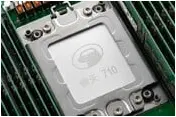Qualcomm Says License Fight Was Because Arm Wants To Make Its Own Server Chips
Qualcomm has amended its complaint against Arm in a 2024 lawsuit, adding more allegations about Arm’s purported breach of license agreements and accusing it of “misrepresenting” their relationship by intending to make its own rival chips.
California-based Qualcomm is countersuing Arm following a trial in December 2024, in which the jury largely found it had not violated its license agreements with the Brit chip designer, as Arm had claimed. The case is likely to be heard in court in March or April 2026.
In redacted court documents seen by The Register, Qualcomm files a motion to amend the complaint claiming that Arm attempted to obstruct its development of Arm-compatible custom cores, and alleges that during the December trial, the chip design biz misrepresented its relationship with Qualcomm.
In the latter situation, it alleges Arm CEO Rene Haas “repeatedly stated that Arm did not view Qualcomm as a competitor because Arm did not build or sell semiconductor chips in the marketplace, which Mr. Haas stated would amount to direct competition between the companies.”
But Arm “is now in the process of designing and distributing its own semiconductor chips,” Qualcomm alleges.
In the court document Qualcomm claims that Arm “sought to hire executives from its customers as early as November,” several weeks before Haas spoke in court, and additionally alleges the recruiter specifically told one such executive this new position would help with Arm’s “transformation from solely designing processor architecture (IP) to also selling its own silicon.”
Persistent talk in the industry has centered on Arm moving to make its own server chips, including a report in the FT claiming Arm had signed a deal to supply Facebook parent Meta with silicon. Both Arm and Meta declined to comment on the claims.
Just to confuse matters further, Arm’s parent, investment house SoftBank Group, announced in March its intention to acquire Ampere, a company that already sells Arm-based server processors.
Qualcomm asserts in the court documents that the trial in December was part of an ongoing effort by Arm, driven by SoftBank, to change tack on its business model. This would see companies such as Qualcomm, which license the Arm instruction set architecture (ISA) in order to design their own processors, instead forced to buy Arm’s own CPU designs.
According to Qualcomm, this came about following the unsuccessful merger attempt with Nvidia, when Arm “pursued a variety of strategies to try to bolster royalty revenues at SoftBank’s behest,” including unsuccessful attempts to impose a pricing model under which device makers would pay royalties based on a percentage of the retail prices of the end products they made.
After releasing a new version of its ISA (Armv9) that makes only “modest, incremental improvements on the prior version,” Qualcomm states, Arm has announced that it will collect double the royalties, and has pressured existing Armv8 licensees to “upgrade” by not releasing or supporting older v8 cores.
In its draft amended complaint, Qualcomm claims that Arm deliberately withheld “deliverables” to which the company was entitled as per the terms of its architecture license agreement (ALA), under the excuse the agreement did not entitle Qualcomm to support for “Nuvia-based technology.”
(Qualcomm’s 2021 takeover of Nuvia, another chip designer that was working on Arm-based server cores, was what sparked last year’s court case.)
In addition, Qualcomm asserts in the new filing that Arm had failed to uphold its obligations under the terms of the separate Technology License Agreement (TLA) between the two by “refusing to offer licenses for its off-the-shelf cores at commercially reasonable prices”, claiming this represents a violation of the licensing provisions negotiated between them.
As an example, it says it submitted requests in April 2024 to renew its licenses for the Cortex-A720 and Cortex-A520 off-the-shelf cores, but despite repeated follow-ups over the following several months, Arm refused to make a licensing offer for either core.
When Arm subsequently did furnish the chipmaker with a licensing offer for the requested technology, the proposal was “extreme and clearly not commercially feasible” for it, Qualcomm claims, and the refusal to offer commercially reasonable terms for any of the requested cores is a breach of the TLA agreement.
Finally, Qualcomm accuses Arm of engaging in a campaign to undermine Qualcomm’s relationships with its customers. It claims this included multiple rounds of letters Arm is alleged to have sent to those customers claiming Qualcomm was in breach of its ALA agreement, and suggesting they might face legal jeopardy from using the company’s products.
The Register asked Qualcomm for comment, but it did not respond.
Arm declined to comment, but it did write to the judge [PDF] overseeing the case to ask for Qualcomm’s request to file an amended complaint to be denied. This was on the grounds that it had demonstrated “undue delay” in filing, and it would unfairly prejudice Arm’s ability to prepare a defense, citing an impending document completion deadline and the fact that discovery closes in three months. ®
A considerable amount of time and effort goes into maintaining this website, creating backend automation and creating new features and content for you to make actionable intelligence decisions. Everyone that supports the site helps enable new functionality.
If you like the site, please support us on “Patreon” or “Buy Me A Coffee” using the buttons below
To keep up to date follow us on the below channels.




